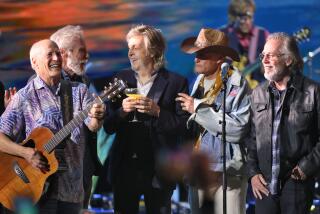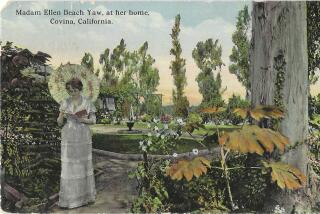With Ella’s Songs in Their Hearts : Review: Ella Fitzgerald is honored with a tribute by jazz and pop stars. But the Pentecostal Community Choir nearly steals the show at Universal Amphitheatre.
Ella wanted to be there, but she couldn’t quite make it. After days of speculation about the First Lady of Song’s possible appearance at the celebration of her 60 years in music at the Universal Amphitheatre Tuesday night, Ella Fitzgerald’s doctors’ advice finally prevailed, and she stayed home.
But the 76-year-old Fitzgerald, who has been plagued by recurring illnesses in the past few years, was still a powerful musical presence in virtually every note of the brisk, well-executed production--in some cases not necessarily to the advantage of artists who, in their eagerness to applaud her achievements, reached too far beyond their creative boundaries.
Perhaps appropriately, the concert, which benefited the Minority AIDS Project, was very nearly stolen from the star-studded array of headliners by the performers who most closely touched the innocence and the wonder so intrinsic to Fitzgerald’s art--the members of the Pentecostal Community Choir. Their two foot-stomping, soul-stirring gospel numbers overflowed with the sheer spirit and joy of music-making.
Fitzgerald’s presence was also vividly apparent in the work of Mel Torme. Only a few years younger than his musical idol (“Ella Fitzgerald,” he announced, “is the best singer in the world”), he nonetheless confirmed, as he so often does, that he is truly her musical offspring. Singing his own lyrics to “Lady Be Good” (“Ella Be Good”), a tune long associated with Fitzgerald’s scat vocalizing, Torme brought the crowd to its feet with a rousing sequence of improvised choruses that cleverly integrated many of her more familiar licks.
Dianne Reeves’ “St. Louis Blues” was every bit as good--a roaring, high-voltage excursion through the most primal of pop song forms--and Lou Rawls’ urbane stylishness on “Since I Fell for You” demonstrated how a jazz/blues-based singer can bring new life to a prosaic pop item.
Barbara Morrison opened the show with an affectionate musical tribute to Fitzgerald, but other jazz-identified performers did not fare quite so well. Joe Williams’ surprisingly low-key “You Go to My Head” was nearly overwhelmed by a too-busy arrangement, and Tony Bennett’s showy rendering of “Old Devil Moon” suggested that he may need to unplug some of his high notes.
Nancy Wilson was, well, Nancy Wilson on “Street of Dreams,” turning in a typically mannered reading in which style too often triumphed over substance. Fortunately George Duke kept the jazz flame alive with an in-the-pocket romp through “Satin Doll.”
To their credit, the pop vocalists on the bill--big names, all--attempted to honor Fitzgerald with material from the catalogue of great American songs. In the case of Stevie Wonder, whose appearance was the climax of the evening, the result was an impressive amalgam of pop, jazz and blues. Singing and playing harmonica on “Too Close for Comfort,” he redefined the tune in a fashion that would have made Fitzgerald smile.
Other pop artists seemed out of their depths, however. Dionne Warwick, who was instrumental in putting the event together, sang a characteristically efficient, if emotionally bland, medley of Gershwin and James Taylor-related songs, and closed the show in a duet with Wonder on “A-Tisket, A-Tasket.” Whitney Houston managed to make “How Long Has This Been Going On?” sound like the theme from a new action movie; Chaka Khan went into musical overload on “Mack the Knife,” and Gladys Knight found guileless simplicity in “The Lady Is a Tramp.”
The tribute was hosted by Debbie Allen, Bill Cosby and Quincy Jones, with Sinbad adding a series of hilariously spontaneous gags.
However, it remained for Maya Angelou’s poem, specially written for Fitzgerald, to place the evening in context: “. . . her sweet voice, singing in the wind. . . . Listen, listen . . . that is the sound of Ella.”
More to Read
The biggest entertainment stories
Get our big stories about Hollywood, film, television, music, arts, culture and more right in your inbox as soon as they publish.
You may occasionally receive promotional content from the Los Angeles Times.






